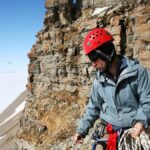When you hear the term “consultant,” is your first mental image a crew of businesspeople with MBAs providing corporate strategy advice?
You wouldn’t be alone. However, the realm of consulting is actually much broader. Imagine teams of engineers designing and building bridges, chemists measuring contaminants in water samples, or botanists writing reports on Arctic vegetation. Scientists can be consultants too!
Scientific training provides skills and knowledge that can be used in many places besides academia. Many practical, real-world problems demand science-based solutions, and draw upon the wisdom of multiple disciplines.
Consulting has room for many professions
I first began consulting as a fresh-faced BSF (forestry) graduate in the mid 1990s. While I played a junior role in my company at the time, I had the opportunity to work with colleagues with expertise in several different fields.
For example, when our clients needed to know if a road could be built on a steep slope, we called in our company geologist. If we needed to know whether there was an endangered goshawk nesting high in the trees, we brought in a wildlife biologist. How was this stretch of forest used by Indigenous peoples pre-contact? This was the terrain of the consulting anthropologist.
Most industry sectors require a variety of professional “-ologists” and engineers, with experience both in the field and the laboratory.
If you can research a topic, you can probably consult on it. Simply put, consultants are problem solvers for hire.
Opportunities for highly trained scientists
Scientific researchers can spend most of their adult life cloistered in preparation for a career in academia. However, consulting provides plenty of legitimate career alternatives.
Dr. Matt Drenner, Senior Fisheries Biologist at Stillwater Sciences, was pursuing postdoctoral research in Canada when an academic colleague told him about a consulting opportunity in California. While his initial career aspirations were to be a professor, taking the job at Stillwater allowed him and his partner to live in a desirable location and have a favorable work/life balance.
With a PhD and postdoctoral experience, Drenner was able to enter the company at a “lower-senior level” rather than as an entry-level employee. He picked up additional skills, such as project management and proposal development, as he went along.
Consulting work uses a similar skill set to academia, but tends to ask questions that require practical, timely answers. For example, a typical project for Drenner and his team might be determining the impact of hydro dam operations on fish populations and creating strategies for remediation and restoration. Some assignments can have social impact. Matt recalled a project that involved devising a study to determine minimum creek flow requirements for fish. The results were later incorporated into state environmental policies.




